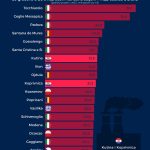Employees in the service sector in Croatia, most of whom are women, work three weeks without interruption and without a free Sunday.
Sunday work has increased by 30%, and only 25% of employees believe that their working hours fit in with family and other commitments, shows a study that was recently published at a conference titled “The balance of work and private life 4.0 – Challenges in time of digitizing” that was presented in Brussels and organized by the European Sunday Alliance.
Europe today is facing challenges that will greatly affect its future, which most certainly includes the demographic that is influenced by job insecurity and heavy and inappropriate working conditions, especially in the retail sector, writes Vecernji List.
Therefore, the EU has launched a new resolution of the “free Sunday” which was signed by Member of the European Parliament Marijana Petir, which actualizes the problem in Croatia with trade unions, employers and the relevant chambers. With this new resolution, the digitization of work space and your personal life can be made available to workers permanently, creating an ‘invisible clear boundary’ of what is related to your job and what is for family and private obligations.
In addition in Croatia, there is also the issue of an increase in night work, although it is often emphasized that a worker may not work more than the hourly rate and that workers should be paid more if they work on Sundays and public holidays. Employees in the service sector in Croatia, most of whom are women, work three weeks without interruption and without a free Sunday, even though numerous studies confirm that Sunday work negatively affects the health of workers, causing emotional exhaustion, constant stress and psychosomatic disorders.
According to Eurostat statistics from 2015, 35% of people work on Sundays in Croatia, which is the highest in Europe. Almost every Sunday 8.3% of Croats work, and those who sometimes work Sundays is 28.3%, which puts Croatia in first place in the EU for those who work most on Sundays, concludes Marijana Petir.







